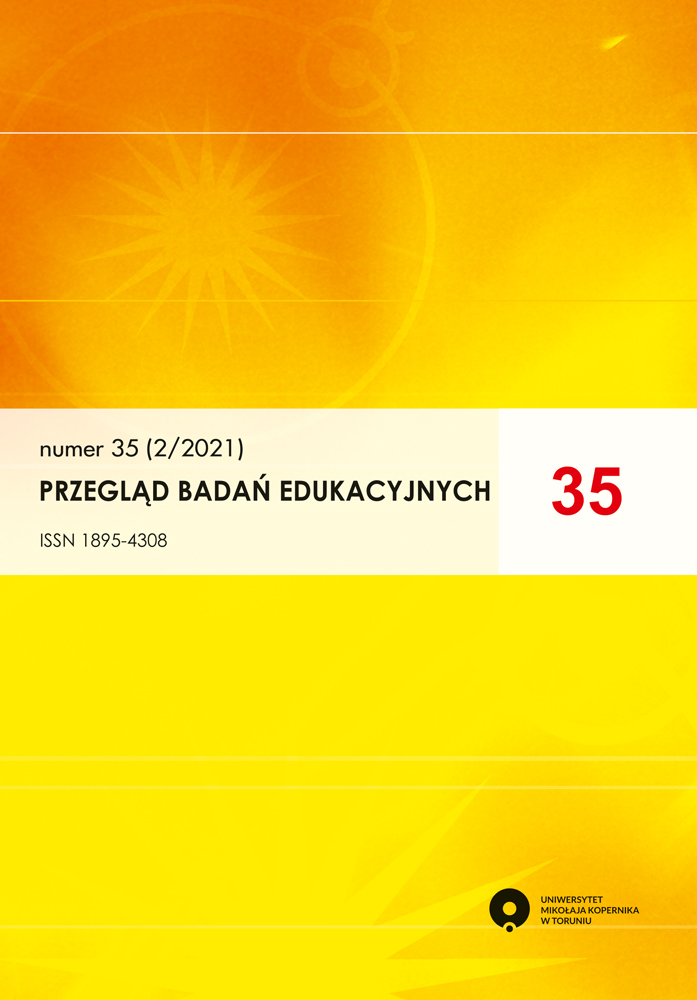The Application of Problem-Centered Interview as a Method of Pedagogical Research
DOI:
https://doi.org/10.12775/PBE.2021.044Abstract
The purpose of the article is to present the qualitative research method known as Problem-Centered Interview and its potential application in pedagogical research. The author demonstrates the main assumptions and stages of the method, simultaneously analyzing the possible benefits and limitations of its use. The originality of the method is confronted with other types of interviews, i.e.: active, in-depth and classical narrative interview. The application of unique qualities of the method,such as: administering three types of reasoning (deductive, inductive and abductive), addressing the prior knowledge bias of the researcher and taking into account afalsification in the validation process, all of which increase the credibility of research conclusions. The Problem-Centered Interview which is placed between the objectivist Grounded Theory and constructionism is able to provide a new insight into education and upbringing. The application of the method makes it possible for the research itself to become an educational situation.
References
Bagoly‐Simó, P., & Hartmann, J. (2020). School Geography Under COVID‐19: Geographical Knowledge in the German Formal Education. Tijdschrift voor Economische en Sociale Geografie, 111, 224–238, doi: 10.1111/tesg.12452.
Bauman, T. (2018). O możliwości zastosowania metod jakościowych w badaniach pedagogicznych [On the Possibility of Qualitative Methods Application in Pedagogical Research]. In: T. Pilch (Ed.), Zasady badań pedagogicznych [The Principles of Pedagogical Research] (pp. 8–64). Warszawa: Wydawnictwo Akademickie Żak.
Caminero, L. (2020). Longing For a Better Lifestyle. The Role of Privileges, Belonging and Place (Re-)making Within International Youth Mobilities to Lisbon. Project: Privileged Mobilities: Local impacts; Belonging and Citizenship (Primob), Lisbon: Primob.
Gaupp, N. (2013). School-to-Work Transitions-Findings from Quantitative and Qualitative Approaches in Youth Transition Research. Forum Qualitative Sozialforschung, 2(14), 10–22, doi: 10.17169/fqs-14.2.1895.
Geisler, S., Rolka, K., & Dehling, H. (2019). Bleiben oder gehen? – Eine Mixed-Methods-Studie zu frühem Studienabbruch und Verbleib von Mathematikstudierenden [Stay or go? – Mixed-Method Research of Staying on Mathematical Studies or Premature Quittance]. In: Y.B. Böhler, S. Heuchmecher, & B. Szczyrba (Eds.), Hochschuldidaktik erforscht wissenschaftliche Perspektiven auf Lehren und Lernen (pp. 79–90). Koln: DUZ Medienhaus.
Gerlach, R. (2015). Badania jakościowe w pedagogice pracy [Qualitative Research in Pedagogy of Work]. Problemy Profesjologii, 2, 14–15.
Goldthorpe, J.H. (1973). A Revolution in Sociology? Sociology, 7, 449–450, doi: 10.1177/003803857300700310.
Holstein, J.A., & Gubrium, J.F. (2016). Narrative Practice and the Active Interview. In: D. Silverman (Eds.), Qualitative Research (pp. 69–72). London: Sage.
Jagieła, J. (2013). Badania jakościowe w pedagogice. Wywiad narracyjny i obiektywna hermenautyka [Qualitative Research in Pedagogy. Narrative Interview and Objective Hermeneutics]. In: D. Urbaniak-Zając, & E. Kos (Eds.), Prace Naukowe Akademii im. Jana Długosza w Częstochowie. Pedagogika, 23, 651–659, doi: 10.16926/p.2014.23.49.
Kelle, U. (2006). Combining Qualitative and Quantitative Methods in Research Practice: Purposes and Advantages. Qualitative Research in Psychology, 3(4), 296, doi: 10.1177/1478088706070839.
Kochanowicz, A.M. (2016). Dziecko w śpiączce. Sens życia, sens troski [A Child in Coma. The Meaning of Life and Care]. Łódź: Palatum.
Kubinowski, D. (2010). Jakościowe badania pedagogiczne [Qualitative Pedagogical Research]. Lublin: UMCS.
Kubinowski, D. (2016). Istota jakościowych badań pedagogicznych – wprowadzenie [The Essence of Qualitative Pedagogical Research – Introduction]. Jakościowe Badania Pedagogiczne, 1(1), 9–10, doi: 10.18276/jbp.2016.1.1-01.
Krzychała, S. (2010). Metoda dokumentarna jako teoria i praktyka badań edukacyjnych, [Documentary Method as Theory and Practice of Educational Research], In: H. Kędzierska (Eds.), Jakościowe inspiracje w badaniach edukacyjnych [Qualitative Inspirations in Educational Research] (pp. 11–30). Olsztyn: Wydawnictwo Uniwersytetu Warmińsko-Mazurskiego.
Madalińska-Michalak, J. (2018). Biuletyn Polskiego Towarzystwa Pedagogicznego [The Polish Pedagogical Association Newsletter]. Retrieved 17 February 2021 from: http://www.ptp-pl.org/sites/default/files/pliki/biuletyn_ptp_3_4_2018.pdf.
Malewski, M. (2012). Metodologia badań społecznych – ortodoksja i refleksyjność [Social Research Methodology – Orthodoxy and Refelxivity]. Teraźniejszość – Człowiek –Edukacja, 4(60), 29, doi: 10.12775/RA.2018.12.
Maszke, A.W. (2005). Metody i techniki badań pedagogicznych [Methods and Techniques of Pedagogical Research]. Rzeszów: Wydawnictwo Uniwersytetu Rzeszowskiego.
Maříková, H. (2020). The Male Childlessness the Perspective of Hegemonic Masculinity. Gender a výzkum, 21, 130–153, doi: 10.13060/gav.2020.007.
Mynarska, M. (2011). Kiedy mieć dziecko? Jakościowe badanie procesu odraczania decyzji o rodzicielstwie [When to Have a Child? A Qualitative Research of Postponing the Decision About Parenthood]. Psychologia Społeczna, 3(18), 230–231.
Pryszmont-Ciesielska, M. (2014). ‘Świat społeczny w kalejdoskopie’, czyli o usytuowaniu badacza w badaniach jakościowych [‘The Kaleidoscope of Social World’, on the Place of Researcher in Qualitative Research]. Teraźniejszość – Człowiek – Edukacja, 1(65), 28–29.
Urbaniak-Zając, D. (2017). Ilość – Jakość: Konsekwencje kłopotliwego kryterium rozróżniania badań empirycznych [Quantity – Quality: Consequences of Perplexing Empirical Research Differentiation Criterion]. Jakościowe Badania Pedagogiczne, 2(2), 110, doi: 10.18276/jbp.2017.2.2-07.
Urbaniak-Zając, D. (2004). Badania interpretacyjne w pedagogice [Interpretative Research in Pedagogy], In: T. Lewocki (Ed.), Pedagogika we współczesnym dyskursie humanistycznym [Pedagogy in Contemporary Humanistic Discourse] (pp. 147–150). Poznań: PTP.
Urbaniak-Zając, D., & Kos, E. (2013). Badania jakościowe w pedagogice. Wywiad narracyjny i obiektywna hermeneutyka [Qualitative Research in Pedagogy. Narrative Interview and Objective Hermeneutics]. Warszawa: Wydawnictwo Naukowe PWN.
Scheibelhofer, E. (2005). A Reflection Upon Interpretive Research Techniques: The Problem-Centered Interview as a Method for Biographic Research. In: N. Kelly, C. Horrocks, K. Milnes, B. Roberts, & D. Robinson (Eds.), Narrative, Memory & Everyday Life (pp. 10–15). Huddersfield: University of Huddersfield.
Szafranek, A. (2016). Rozwiązywanie sytuacji przemocowych w domach pomocy społecznej jako przeciwdziałanie wykluczeniu społecznemu mieszkańców [Solving Violent Situations in Nursing Homes as a Countermeasure for Social Exclusion of Residents]. In: E.M. Guzik-Makaruk (Ed.), Wybrane prawne, kryminologiczne i medyczne aspekty wykluczenia społecznego [Selected Law, Criminological and Medical Aspects of Social Exclusion]. Warszawa: Temida.
Witzel, A.H., & Reiter, H. (2012). The Problem-Centered Interview Principles and Practice. London: Sage.
Zaremba, K. (2015). Charakterystyka nieprzystosowania społecznego młodzieży podsądnej [The Profile of Socially Maladjusted Juveniles]. Profilaktyka Społeczna i Resocjalizacja, 27, 18–20.
Downloads
Published
How to Cite
Issue
Section
License
Copyright (c) 2021 Przegląd Badań Edukacyjnych (Educational Studies Review)

This work is licensed under a Creative Commons Attribution-NoDerivatives 4.0 International License.
Stats
Number of views and downloads: 1840
Number of citations: 0



